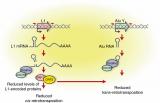
12/9/2013
The integrity of the human genome depends on a protein complex that controls the behavior of mobile DNA
Researchers of the Regulatory Genomics group of GRIB (IMIM/ UPF) led by E. Eyras have participated in this study published at Nature Structural and Molecular Biology Journal, which describes the mechanism by which most human cells can avoid being "bombarded" by mobile DNA fragments. This repetitive DNA has the ability to make a copies, which get inserted into other locations in the genome.
All the cells of our species contain a protein complex called "microprocessor", whose function is to generate small regulatory RNA molecules known as microRNAs. In this paper, the authors show that this complex also acts as a guard and defender of the integrity of the human genome. Thus, these proteins recognize DNA sequences and mobile fragments that escaped the control mechanisms preventing their replication and insertions into the genome.
Article Reference:
Heras SR, Macías S, Plass Mireia, Fernández N, Cano D, Eyras E, García-Pérez JL, Cáceres JF. The Microprocessor controls the activity of mammalian retrotransposons. Nat Struct Mol Biol, 2013



